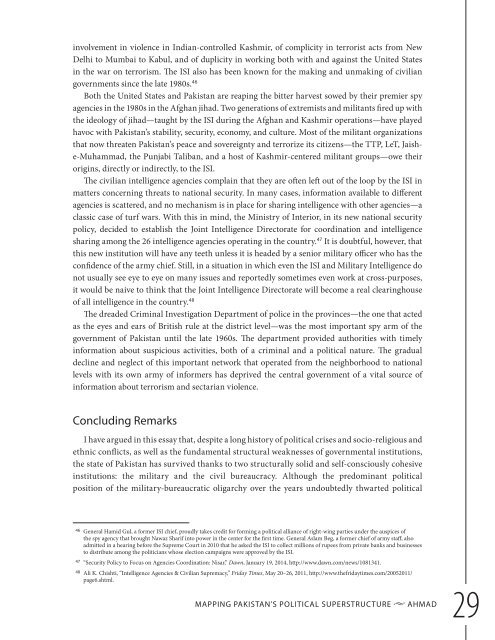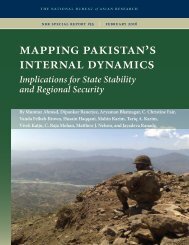pakistan’s
SR55_Mapping_Pakistan_February2016
SR55_Mapping_Pakistan_February2016
You also want an ePaper? Increase the reach of your titles
YUMPU automatically turns print PDFs into web optimized ePapers that Google loves.
involvement in violence in Indian-controlled Kashmir, of complicity in terrorist acts from New<br />
Delhi to Mumbai to Kabul, and of duplicity in working both with and against the United States<br />
in the war on terrorism. The ISI also has been known for the making and unmaking of civilian<br />
governments since the late 1980s. 46<br />
Both the United States and Pakistan are reaping the bitter harvest sowed by their premier spy<br />
agencies in the 1980s in the Afghan jihad. Two generations of extremists and militants fired up with<br />
the ideology of jihad—taught by the ISI during the Afghan and Kashmir operations—have played<br />
havoc with Pakistan’s stability, security, economy, and culture. Most of the militant organizations<br />
that now threaten Pakistan’s peace and sovereignty and terrorize its citizens—the TTP, LeT, Jaishe-Muhammad,<br />
the Punjabi Taliban, and a host of Kashmir-centered militant groups—owe their<br />
origins, directly or indirectly, to the ISI.<br />
The civilian intelligence agencies complain that they are oten let out of the loop by the ISI in<br />
matters concerning threats to national security. In many cases, information available to different<br />
agencies is scattered, and no mechanism is in place for sharing intelligence with other agencies—a<br />
classic case of turf wars. With this in mind, the Ministry of Interior, in its new national security<br />
policy, decided to establish the Joint Intelligence Directorate for coordination and intelligence<br />
sharing among the 26 intelligence agencies operating in the country. 47 It is doubtful, however, that<br />
this new institution will have any teeth unless it is headed by a senior military officer who has the<br />
confidence of the army chief. Still, in a situation in which even the ISI and Military Intelligence do<br />
not usually see eye to eye on many issues and reportedly sometimes even work at cross-purposes,<br />
it would be naive to think that the Joint Intelligence Directorate will become a real clearinghouse<br />
of all intelligence in the country. 48<br />
The dreaded Criminal Investigation Department of police in the provinces—the one that acted<br />
as the eyes and ears of British rule at the district level—was the most important spy arm of the<br />
government of Pakistan until the late 1960s. The department provided authorities with timely<br />
information about suspicious activities, both of a criminal and a political nature. The gradual<br />
decline and neglect of this important network that operated from the neighborhood to national<br />
levels with its own army of informers has deprived the central government of a vital source of<br />
information about terrorism and sectarian violence.<br />
Concluding Remarks<br />
I have argued in this essay that, despite a long history of political crises and socio-religious and<br />
ethnic conflicts, as well as the fundamental structural weaknesses of governmental institutions,<br />
the state of Pakistan has survived thanks to two structurally solid and self-consciously cohesive<br />
institutions: the military and the civil bureaucracy. Although the predominant political<br />
position of the military-bureaucratic oligarchy over the years undoubtedly thwarted political<br />
46 General Hamid Gul, a former ISI chief, proudly takes credit for forming a political alliance of right-wing parties under the auspices of<br />
the spy agency that brought Nawaz Sharif into power in the center for the first time. General Aslam Beg, a former chief of army staff, also<br />
admitted in a hearing before the Supreme Court in 2010 that he asked the ISI to collect millions of rupees from private banks and businesses<br />
to distribute among the politicians whose election campaigns were approved by the ISI.<br />
47 “Security Policy to Focus on Agencies Coordination: Nisar,” Dawn, January 19, 2014, http://www.dawn.com/news/1081341.<br />
48 Ali K. Chishti, “Intelligence Agencies & Civilian Supremacy,” Friday Times, May 20–26, 2011, http://www.thefridaytimes.com/20052011/<br />
page6.shtml.<br />
MAPPING PAKISTAN’S POLITICAL SUPERSTRUCTURE u AHMAD<br />
29



